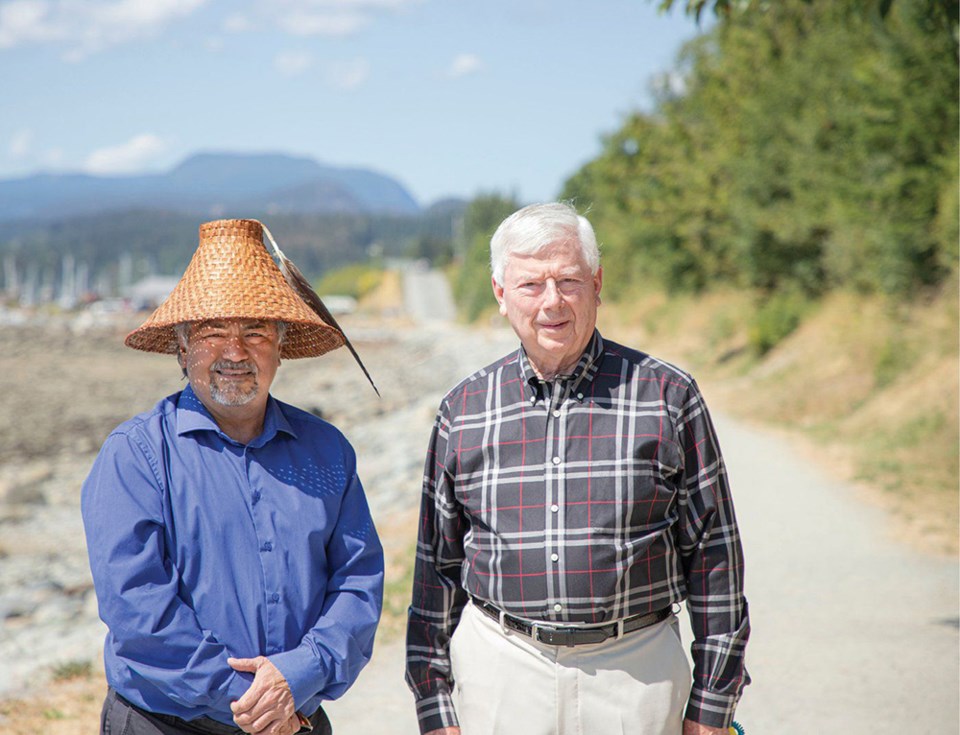Back in 2001, when Stewart Alsgard was mayor of Powell River, he kicked off a project to redevelop the downtown waterfront area around the Westview Ferry Terminal. City planners had imagined an attractive Seawalk, a pier, a park and more.
Watching the construction one day, things took a swift turn.
“We were in the process of building the Seawalk, and had been bulldozing the area to start developing it,” recalls Stewart.
“I remember I felt a firm grasp on my shoulder. [Then-Tla’amin Chief] Qwastånayå (L. Maynard Harry) said ‘Stop it’.
“I had a lot of thoughts going through my mind, but the biggest one was: What have I done?” says Stewart.
“I had not even thought to consult Tla’amin about the development; we also hadn’t noticed the petroglyphs that had been destroyed.”
That’s the moment Stewart realized things would have to proceed differently in what’s now known as qathet – and he and Maynard began work on the 2003 Community Accord.
“We got together, me and my city council, and Maynard with his council, along with an elder, and over time, came to an agreement.”
That initial agreement was for Powell River’s Council to offer Tla’amin the contract for finishing the Seawalk, and to make sure the Nation had protection over the historical land.
But much more than that, the Community Accord laid out a first-in-Canada roadmap for how two local governments would work together in the future to resolve conflicts as they emerge.
Both Stewart and Maynard acknowledge that 2021 is a tense time for the two communities; not only is the Tla’amin Nation Treaty newly in effect, but the Nation’s government has asked the City to change its name and drop the reference to Dr. Israel Powell.
Over the past two decades, Maynard has travelled across Canada many times sharing with other communities the wisdom contained in the Accord.
“I am very proud of it,” Maynard states. Of all the places he has visited, the relationship between the two governments here is the best, he says. Maynard also says that he respects Stewart and his council because they learned, and wanted to learn from Tla’amin Nation.
He is pleased that the initial agreements and respect the Accord laid out are being followed by today’s Mayor and council.
“I think they are doing a fine job,” says Maynard. “The communities and leaders are very good at demonstrating respect. They continue to have many meetings each year, which are held in both government’s buildings. The aim of the Accord was to keep communities connected, it is good for the kids and for others within those communities.”
Regarding the name change, Stewart notes that, “Everything needed for this situation is right there within the Accord. And it is being followed; both governments are having meetings about this topic currently in order to come to an agreement. So I think they will find a way to work this out.”
Since the initial signing in 2003, Sliammon First Nation has become the self-governing Tla’amin Nation, and Powell River incorporated into a City. These changes prompted a new signing and update of the Community Accord. This happened July 20, 2018, between Mayor Dave Formosa, City Council, Hegus Clint Williams, Legislators, as well as elders, meaning many more signatures were included. The Accord was updated to reflect the new governing institutions:
• Acknowledging each community has different beliefs, cultures, and values.
• Developing recognition, understanding, reconciliation, and respect.
• Appreciation of each community’s diverse background.
Alsgard said that the most important part of the document is the last article, the living document,
“Because it is living, it is here forever, and hopefully, forever it will be used. It is subject to change, so that it reflects the parties’ relationship. Those changes have to be mutually agreed upon.” He says that everyone is allowed to use and follow the Community Accord.
“Others need to be more like us. They have to get to know each other. It is important for the kids of future generations to be learning and understanding, and losing that sense of fear and suspicion. The Accord brought the community together and it showed great leadership, it really was groundbreaking work.”
“I am proud of the work both communities have done, the leaders are doing very good jobs,” said Maynard.
20 years ahead of our time: City’s proudest document
The Community Accord is a landmark living document. The District of Powell River and Sliammon First Nation signed this on May 10, 2003. The Accord contains six different articles stating guidelines for the two communities in order to cooperate with each other in an understanding and respectful way.
• Article one is about mutual recognition, that each area recognizes the other’s inhabitants, governance, and interests.
• Article two is principles of cooperation, which explains mutual respect and considering common grounds when communities are discussing things.
• Article three explains maintenance of relationships.
• Article four is inclusion and information on the community at large.
• Article five explains dispute resolutions.
• Article six is the last, and states that the accord is a living document, meaning it is subject to change according to the relationship between communities, and that these changes must be agreed upon mutually.
The Protocol Agreement on Culture, Heritage, and Economic Development grew out the Accord, and was signed in 2004. This again, is a landmark document for both the City of Powell River and Tla’amin Nation, as it works to protect and promote the culture and heritage of this area, while also allowing joint efforts for economic development.
https://s3.ca-central-1.amazonaws.com/civicinfo/public_files/First%20Nations/Community_Accord--Sliammon_First_Nation_and_Powell_River--2003.pdf



